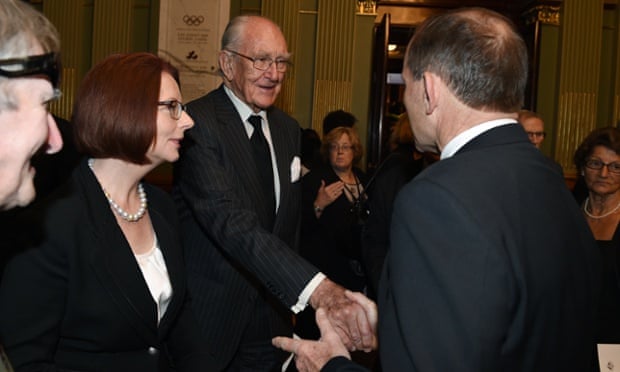
Lenore Taylor Friday 20 March 2015
John Howard praised Fraser’s ability to restore order to the nation’s affairs, a standard that would see protégé Abbott judged very harshly
Malcolm Fraser is greeted by Tony Abbott following the memorial service for former prime minister Gough Whitlam in November 2014. Photograph: Dan Himbrechts/AAP
Successors, on both sides of politics, often criticised Malcolm Fraser for not doing enough to modernise the Australian economy. Judging him solely by this yardstick, they argued the “wasted” Fraser years were something every leader had to strive to avoid. But John Howard, Fraser’s treasurer, who criticised his timidity on economic change, did concede that Fraser had “restored a sense of order” after the Whitlam years.
Which begs the question as to what Howard must make of his protégé Tony Abbott, who appears on track to achieve little for the economy, and create a maximum sense of chaos in the process.
This week, for example, Abbott has apparently decided that if he smiles winningly and displays a sunny disposition the electorate won’t notice that much of his first-term agenda is lying in a smoking ruin somewhere outside the Senate chamber.
The intergenerational report, until recently billed as a document that would shock voters into accepting deeper spending cuts, is now being used to justify not cutting any more, backed by a taxpayer-funded advertising campaign so meaningless it is fit for either purpose.
For the third time in recent years, Australia finds itself with a prime minister motivated almost entirely by survival, rather than leading – paralysed by their tenuous hold on the job and their diminishing authority – with their party looking on in horror but divided as to how to respond. The most common response from Coalition MPs this week when asked to explain their budget and political strategy is: “If you find out, can you tell me?”
Some columnists seem to have decided that complacent voters are to blame (and perhaps to some extent Tony’s poor “salesmanship”) for selfishly refusing to see looming economic problems and to accept the specific policy solutions that the government has sought to thrust upon them.
But perhaps, rather than dazzling them with sudden-onset economic optimism or berating them for being short-sighted and selfish it might be smarter to consider why the electorate is so resistant to Tony Abbott’s politics, just as it was resistant to the agenda of the Labor government he replaced.
Some of it comes down to the now well-traversed difficulties of a 24-hour media cycle that amplifies every trivial misstep and has no patience for complex argument, a Senate voting system that means the government almost never controls the upper house and the negativity of recent oppositions.
Political malaise
But as I have argued before I think much more than this, it comes down to trust – or lack of it.
Our political malaise is rooted in a deep mistrust, fed not just by broken promises (from both sides) but also by the whole political mindset that voters can’t cope with a contest of ideas or be trusted with information, which is seen as an asset best held tight.
It is a mistrust exacerbated by the calculation that slogans and slick advertising can gloss over contradictions or the absence of policy facts. It is a top-down political mindset ever more out of step with an open-sourced world of shared information and this mismatch keeps making the problem worse.
And we see it everywhere.
It’s there in the big things, like the government taking the useful and supposedly independent forward planning exercise of the intergenerational report and politicising it with comparative graphs based on spurious assumptions. The report does show that Australia has budget challenges in the longer term. It does not show – as Abbott asserts – that the Coalition has “already halved Labor’s debt and deficit”. That claim is based on projected deficits in 2055 (when Abbott is 98) obtained through heroic assumptions that make the “Labor” line look dramatically worse and the “existing Coalition policy” line dramatically better. Why debase the report with transparent political tricks. Why “spin” useful information rather than just discuss it honestly. We really aren’t that stupid.
It’s there in the smaller things, like the government’s announcement this week that it would try to exempt private companies from new tax transparency laws because of concerns about safety and kidnappings. What this really boils down to is a belief that the public has no right to this information, or the somewhat more reasonable concern that it might be misinterpreted when provided. From the highest levels down, the Coalition really thinks the tax office should be allowed to do its job and that this kind of transparency serves serves little useful purpose – despite evidence from around the world that public transparency provides potent arguments for tightening tax laws and cracking down on avoidance.
It’s there in the background behind the stoush between Barnaby Joyce and his now-sacked departmental secretary Paul Grimes, because Grimes was transferred to the agriculture department after the incoming Coalition government sacked three departmental heads, two of whom had been in charge of policies of the former Labor government that the Coalition really didn’t like. And when the Grimes/Joyce relationship didn’t work out, they sacked him, too. Of course this must have a chilling effect on the willingness of the public service to provide frank advice, even now, when it would seem to be sorely needed.
It’s there in the mindset that would push metadata laws through the House of Representatives without giving MPs a chance to read them, that would negotiate laws pertaining to journalists without consulting media companies or the union until a deal was done, and that would think the public would happily accept such surveillance without bothering to make much of an effort to explain it.
It’s there in education minister Christopher Pyne’s ridiculous threats to research funding and comical assertions that he is a “fixer” even as his university policy lies in tatters, or the thinking that would even contemplate a double dissolution election to roll the dice again to get a more compliant Senate, having utterly failed to properly negotiate with this one. It’s there in the strategy of announcing a surprise Medicare co-payment in last year’s budget and presenting it to the medical profession with what was essentially an ultimatum.
A matter of trust
And of course it all began because the Coalition didn’t trust the electorate enough to tell us about many of their policies before the election, which to date is exactly what Labor is also doing. Like Abbott in opposition, Bill Shorten promises policies well before the next poll. Like the Coalition in opposition, senior Labor figures laugh at the suggestion that they might provide any kind of a political target when criticism is trained so squarely on the government.
But perhaps the key to breaking this cycle of the electorate voting in the small-target least-worst option of the opposition (and then deciding they’re just as bad) is to take that leap of faith, to take the electorate on trust.
Perhaps Shorten will surprise us. Perhaps Abbott will use the tax and federation white papers to have a genuine debate. But surely it’s too early to decide the political system is broken or that the selfish voters don’t understand economic reality before someone actually tries.
Who knows, perhaps crediting the electorate with the intelligence to cope with a policy discussion might both “restore a sense of order” and the legitimacy that would allow a government to actually get something done.

EmoticonEmoticon